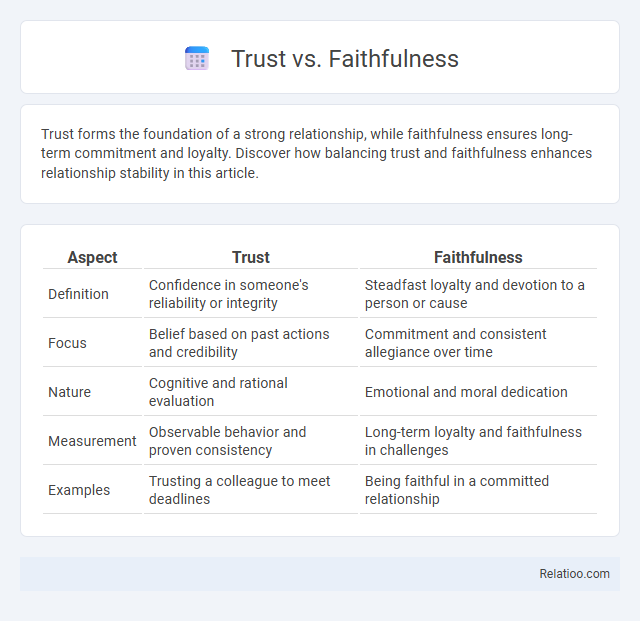Trust forms the foundation of a strong relationship, while faithfulness ensures long-term commitment and loyalty. Discover how balancing trust and faithfulness enhances relationship stability in this article.
Table of Comparison
| Aspect | Trust | Faithfulness |
|---|---|---|
| Definition | Confidence in someone's reliability or integrity | Steadfast loyalty and devotion to a person or cause |
| Focus | Belief based on past actions and credibility | Commitment and consistent allegiance over time |
| Nature | Cognitive and rational evaluation | Emotional and moral dedication |
| Measurement | Observable behavior and proven consistency | Long-term loyalty and faithfulness in challenges |
| Examples | Trusting a colleague to meet deadlines | Being faithful in a committed relationship |
Understanding Trust: Definition and Significance
Trust is the confident reliance on the integrity, ability, or character of a person or thing, forming the foundation of meaningful relationships and effective collaboration. It differs from faithfulness, which emphasizes loyalty and steadfastness to commitments or individuals, while faith generally pertains to belief without proof. Understanding trust enables you to build stronger connections and make informed decisions based on reliability and predictability.
Defining Faithfulness: Meaning and Importance
Faithfulness denotes unwavering loyalty and steadfast commitment to a person, cause, or belief, reflecting reliability and consistency in actions and intentions. It is a critical component in nurturing deep relationships and fostering trust, ensuring that promises and responsibilities are honored over time. Emphasizing faithfulness can strengthen bonds by creating a foundation of dependability and emotional security.
Key Differences Between Trust and Faithfulness
Trust involves your confidence in someone's reliability or ability, based on past experiences or evidence, while faithfulness reflects a steadfast loyalty or commitment regardless of circumstances. Trust can fluctuate as situations change or new information emerges, whereas faithfulness represents a consistent and enduring dedication. Understanding these differences helps you navigate relationships by recognizing when you are relying on proven reliability versus unwavering allegiance.
The Role of Trust in Relationships
Trust forms the foundation of healthy relationships by fostering honesty, reliability, and emotional safety, enabling deeper connections between partners. Faithfulness, while essential, builds on this trust through consistent loyalty and commitment, reinforcing the bond and preventing betrayal. Your ability to cultivate trust directly influences the strength and longevity of your relationships, making transparency and dependability vital components.
The Impact of Faithfulness on Long-Term Commitment
Faithfulness directly strengthens long-term commitment by fostering consistent reliability and emotional security within relationships. Your unwavering faithfulness builds trust over time, creating a stable foundation that encourages deeper connection and resilience through challenges. This enduring commitment often results in mutual growth and sustained partnership satisfaction.
Building Trust: Essential Steps and Strategies
Building trust requires consistent honesty, transparency, and reliability to establish a strong foundation in relationships. Demonstrating accountability and following through on commitments reinforces trustworthiness over time. Effective communication and empathy play critical roles in nurturing mutual trust and deepening connections.
Nurturing Faithfulness: How to Stay Loyal and True
Nurturing faithfulness requires consistent commitment, clear communication, and mutual respect to strengthen loyalty in your relationships. Building trust through transparency and reliability solidifies faithfulness, creating a foundation for enduring connections. You can stay true by prioritizing shared values and addressing challenges with empathy and patience.
Trust Breaches: Causes and Consequences
Trust breaches often stem from unmet expectations, dishonesty, or lack of communication, causing significant damage to relationships and organizational dynamics. Consequences include erosion of confidence, increased conflict, and reduced collaboration, impacting both personal and professional environments. Recognizing the distinct roles of trust, faithfulness, and faith helps you address breaches effectively and rebuild stronger connections.
Maintaining Faithfulness Amid Temptations
Maintaining faithfulness amid temptations requires a deep commitment to personal values and consistent actions that reinforce trust within relationships. Trust serves as the foundation, while faithfulness manifests through loyalty and resilience against distractions or enticements. Cultivating open communication and emotional transparency supports sustaining faithfulness by addressing potential vulnerabilities before they compromise trust.
Balancing Trust and Faithfulness in Everyday Life
Balancing trust and faithfulness in everyday life requires recognizing trust as confidence in someone's reliability, while faithfulness involves unwavering loyalty and commitment. Effective relationships thrive when individuals maintain trust through consistent actions and demonstrate faithfulness by honoring promises and shared values. Cultivating this balance promotes emotional security and strengthens interpersonal bonds over time.

Infographic: Trust vs Faithfulness
 relatioo.com
relatioo.com